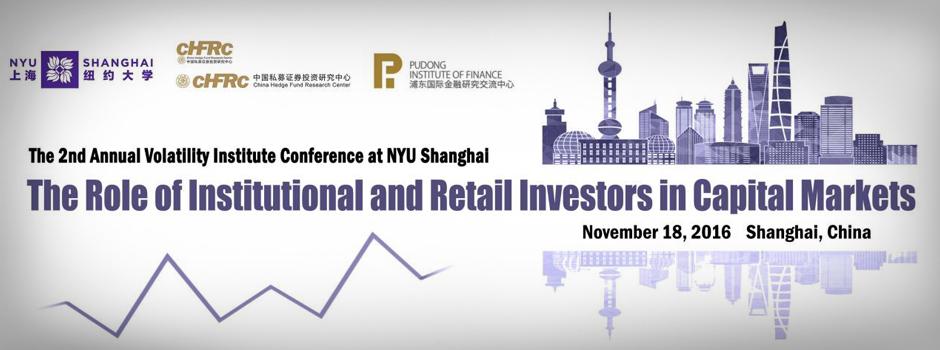Nobel Prize laureate, NYU Professor of Finance Robert Engle returned to Shanghai in mid-November, joining students, researchers and business practitioners in an academic fest that offered cutting-edge insight on the volatility of China’s capital markets.
As one of the keynote speakers for the Second Annual Volatility Institute Conference at NYU Shanghai on November 18, Professor Engle addressed some 300 participants on China’s equity market. He said the Chinese market is less connected to western markets than Hong Kong’s, as he compared the correlation of volatility and returns among Shanghai Stock Exchange Composite Index, S&P 500 Index and Hang Seng Index during the past 24 years.
Based on the results, Professor Engle laid out a series of conclusions with regard to the Chinese market:
- Undercapitalization of the banking sector makes the financial system vulnerable to shocks and crises.
- Forced rapid deleveraging will lead to sales of underperforming loans at heavily discounted prices and ultimately default.
- Transparent stress tests followed by recapitalization should restore the performance of the sector.
- Economic growth will also strengthen the bank balance sheets, but this is now a global problem.
He called for more responsible fiscal policy, as well as reforms in infrastructure, education, and economic structure, saying China must now solve its own debt crisis.
The conference, which sought to better understand the effect of retail versus institutional trading on capital markets, also presented eight outstanding research papers from among 56 submissions. The research covered a broad range of topics from the analysis of communication and comovement in online stock forums, to the study of Chinese investors by comparing stock splits in both China and the US.
Describing the conference as “a highlight of the year,” Jeffrey Lehman, Vice Chancellor of NYU Shanghai, said the NYU Shanghai community was excited by the high level talent and the quality of speakers that the conference now attracted.
“This kind of rigorous academic analysis of important economic and policy questions, which are critical to China and to the whole world, is the exact work that is celebrated at NYU Shanghai,” Lehman said. He added that part of NYU Shanghai’s mission is to become a source of research for the local market and regulators.
On November 19, Professor Engle carried on his tradition since the launch of the Volatility Institute at NYU Shanghai (VINS) by meeting with students for a casual Saturday chat on campus--this time covering everything from climate change, Bob Dylan’s Nobel Prize to Donald Trump’s proposed infrastructure plans.
“Sitting here in Shanghai and then going back to New York, you can see a difference. There are a lot of facilities in New York that are a little bit tired compared with here,” said Engle, who commented that Trump’s idea of investing in infrastructure is “a good idea” even if it did not appear to be “at the top of his priority list.”
Engle advocated more expenditures, stating “if the money you make on an invested project is greater than the cost of servicing the debt, then it is a good deal.”
He reasoned that along with improved transportation networks and more jobs, increased tax revenue from workers and say, concrete and steel companies used in the building of roads or airports, would “match the interest rates” of such investments. “If your investments are productive, it should be a very profitable thing for the government to do,” he added.
Looking at climate change from an economic and finance standpoint, Engle brought up concerns of it being a “long-run risk--a gigantic cost which might materialize sometime in the distant future.” As for the new Nobel Laureate Bob Dylan, Engle said, “All these pictures now of Dylan are of him in the 60s—I have yet to see what he looks like today. He’s probably just an ordinary looking guy now, anyway.”
The talk was introduced and moderated by Zhou Xin, Executive Director of VINS.
Read about last year’s student chat with Robert Engle’s here.



